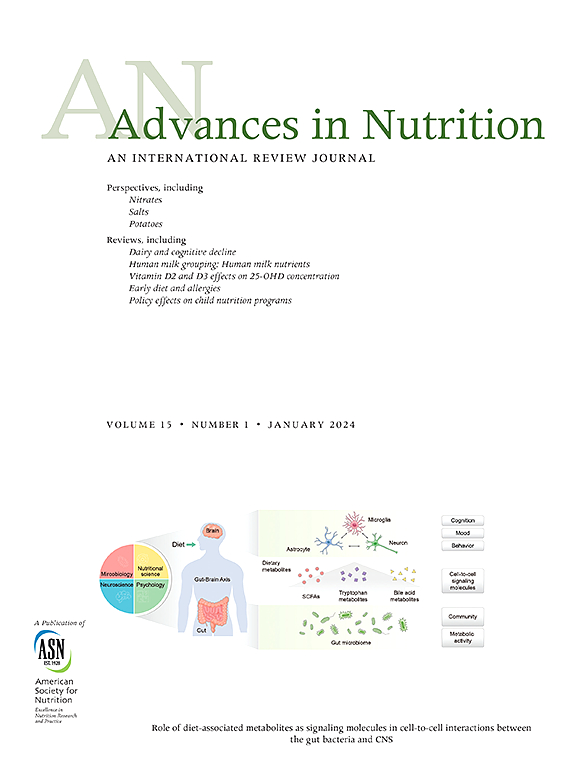Food-based indexes and their association with dietary inflammation
IF 9.2
1区 医学
Q1 NUTRITION & DIETETICS
引用次数: 0
Abstract
Chronic inflammation is associated with an increased risk of noncommunicable diseases, prompting an intensified interest in the diet-disease relationship for modulating inflammation. Diet quality indexes are widely used to quantify dietary patterns. However, the optimal tool for assessing dietary quality in relation to chronic inflammation remains unclear. The objective of this study was to synthesize the literature on food-based diet quality indexes and their association with chronic inflammation. A systematic scoping review of scientific databases was conducted from inception to March 2024. Studies describing the development and validation of original dietary inflammatory indexes or assessed associations between established indexes and inflammatory biomarkers were included. Studies that predominantly focused on nutrient-based indexes were excluded. Forty-three food-based indexes, evaluated across 65 studies, were categorized into 4 distinct groups based on dietary patterns (n = 18), dietary guidelines (n = 14), dietary inflammatory potential (n = 6), and therapeutic diets (n = 5). Established indexes based on the Mediterranean diet and dietary guidelines were the most extensively utilized, demonstrating inverse associations with several inflammatory biomarkers across diverse populations. The Anti-Inflammatory Diet Index, Dietary Inflammation Score, and Empirical Dietary Inflammatory Index were identified as robust, empirically derived indexes to assess diet quality based on their inflammatory potential. The dietary composition of the evaluated indexes ranged from 4 to 28 dietary components, with fruits, vegetables, whole grains, and legumes consistently classified as favorable, whereas red/processed meats and added sugars were unfavorable. This scoping review identified several promising food-based indexes for assessing inflammation-related diet quality. Methodological variations and inconsistencies in algorithms underscore the need for further validation across diverse populations. Future research should consider the scoring methods, dietary composition, and validated inflammatory biomarkers when selecting indexes to evaluate diet-inflammation associations. Understanding the characteristics that underpin these indexes informs their application in nutrition research and clinical practice.
以食物为基础的指数及其与饮食炎症的关系。
背景:慢性炎症与非传染性疾病的风险增加有关,这促使人们对调节炎症的饮食-疾病关系的兴趣日益浓厚。膳食质量指数被广泛用于量化膳食模式。然而,评估饮食质量与慢性炎症关系的最佳工具仍不清楚。目的:综合有关食源性饮食质量指标及其与慢性炎症的关系的文献。方法:对科学数据库从成立到2024年3月进行系统的范围评估。研究描述了原始饮食炎症指数的发展和验证,或评估了已建立的指数与炎症生物标志物之间的关联。主要关注营养指标的研究被排除在外。结果:在65项研究中评估的43项基于食物的指标被分为四组:饮食模式(n=18)、饮食指南(n=14)、饮食炎症潜力(n=6)和治疗性饮食(n=5)。建立在地中海饮食和饮食指南基础上的指数得到了最广泛的应用,在不同人群中显示出与几种炎症生物标志物的负相关。抗炎饮食指数(AIDI)、饮食炎症评分(DIS)和经验饮食炎症指数(EDII)被认为是基于炎症潜力评估饮食质量的可靠的经验衍生指标。膳食成分的评估指数范围从4到28个膳食成分,水果、蔬菜、全谷物和豆类一直被列为有利的,而红/加工肉类和添加糖是不利的。结论:本综述确定了几个有前景的基于食物的指标来评估与炎症相关的饮食质量。方法上的差异和算法的不一致性强调了在不同人群中进一步验证的必要性。未来的研究在选择评估饮食与炎症关联的指标时,应考虑评分方法、饮食组成和经过验证的炎症生物标志物。了解支撑这些指标的特征有助于它们在营养研究和临床实践中的应用。
本文章由计算机程序翻译,如有差异,请以英文原文为准。
求助全文
约1分钟内获得全文
求助全文
来源期刊

Advances in Nutrition
医学-营养学
CiteScore
17.40
自引率
2.20%
发文量
117
审稿时长
56 days
期刊介绍:
Advances in Nutrition (AN/Adv Nutr) publishes focused reviews on pivotal findings and recent research across all domains relevant to nutritional scientists and biomedical researchers. This encompasses nutrition-related research spanning biochemical, molecular, and genetic studies using experimental animal models, domestic animals, and human subjects. The journal also emphasizes clinical nutrition, epidemiology and public health, and nutrition education. Review articles concentrate on recent progress rather than broad historical developments.
In addition to review articles, AN includes Perspectives, Letters to the Editor, and supplements. Supplement proposals require pre-approval by the editor before submission. The journal features reports and position papers from the American Society for Nutrition, summaries of major government and foundation reports, and Nutrient Information briefs providing crucial details about dietary requirements, food sources, deficiencies, and other essential nutrient information. All submissions with scientific content undergo peer review by the Editors or their designees prior to acceptance for publication.
 求助内容:
求助内容: 应助结果提醒方式:
应助结果提醒方式:


